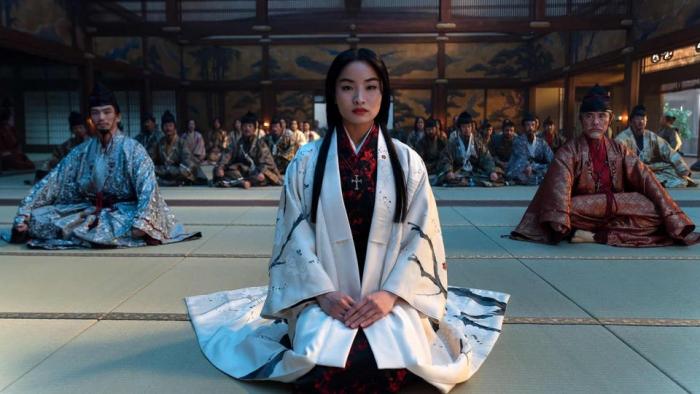

Give ‘Shogun’s Anna Sawai All the Emmys
By Chris Revelle | TV | April 23, 2024 |
By Chris Revelle | TV | April 23, 2024 |

As a historical fiction epic, Shōgun tells us the grand and sweeping tale of how Toranaga Yoshii rose to power against nearly impossible odds and became the shogun or military dictator of Japan. It’s a heady series, often concerned with the seismic shifts of power and delicate political machinations, and this makes the scope of Shōgun feel quite broad as if we’re flying above the fray to take it all in. Such stories can become cold and unengaging unless we’re given characters to follow, root for, and understand. Unless we had a human component to connect to, Shōgun might otherwise have been a particularly lush historical re-enactment.
The series dances deftly between its bird’s eye view of the political and military maneuvers and its more intimate proximity to specific characters’ inner lives. We learn of John Blackthorne’s terminal restlessness that seems assuaged only by the sea and of Fuji’s emotional travails as she mourns her family while finding purpose in a new role, but it’s in our exploration of Toda Mariko’s interiority that we truly unlock the heart of Shōgun. Thanks to Anna Sawai’s exemplary performance, I came to understand Shōgun as not only a story about a bloody rise to power but as one about the fatal tension between what one wants for oneself and what one feels bound to do.
Beware, there are spoilers on the other side of this gif.
For the first few episodes of Shōgun, Mariko is the unfailingly gracious guide and translator who steers John (and the viewers) through unfamiliar cultural territory. Though placid in presentation, Mariko is immediately fascinating as a character; a daughter of Japanese culture who has converted to Catholicism and serves as a translator for both the Portuguese priests and the English John. Mariko is composed and poised, doing her job at Lord Toranaga’s behest with maximum courtesy. Her time with John begins to draw her out of her shell; we see her smile and laugh at his jokes and she begins to share more about her life. We learn of her fraught marriage to Toda Buntaro, a Toranaga samurai who abuses her, and we also come to understand the lacerating truth of her past. Mariko’s father, Akechi Jinsai, was a decorated vassal of Lord Kuroda, who was the ascendent warlord of the previous era. When Kuroda became mad with power and violence, Jinsai made the difficult choice to kill his lord. The dishonor of this betrayal could only be addressed with the entire Akechi clan committing seppuku, with the notable exception of Mariko. She had married Buntaro by this point and was no longer required to die as an Akechi. By the time we meet her, Mariko seems to have drowned in survivor’s guilt and seeks to join her family in honorable death as a way to escape her misery. Each year, she asks Buntaro to permit her to commit seppuku, and each year, he refuses.
The backbone of Shōgun is made up of tradition and cultural mores. Every interaction, no matter how grand or how minor, demonstrates the Japanese rules of engagement. Much of John’s plotline revolves around bumping up against these standards, like when he facetiously says whoever touches a pheasant curing outside will “die” and this leads to the death of an elderly gardener. He is an outsider seeking freedom, blundering into a system he doesn’t understand, and struggles to respect. Mariko is an incredible counterpoint: an aristocrat born into the culture seeking her freedom even as she feels compelled to perform her duties to Toranaga. This tension between their characters makes for an aching romance, one as irresistible as it is impossible. Fleetingly, they escape into their connection to enjoy brief moments of a freer life together.
Throughout the series, Anna Sawai shows us every shade of Mariko’s manifold emotions and her conflicted thoughts through her absolute wonder of a face. Sadness, disappointment, and rage flicker in her eyes like smoldering embers while her mouth remains a calm sea. Mirth and happiness bloom like rare and joyful flora, all the warmer and more heartbreaking for how few of these moments Mariko seems to have. Sawai imbues Mariko with such poetic longing and such devout restraint that you can’t help but feel your heartstrings thrum. Like a swan, Sawai hides Mariko’s turbulent darkness under the surface of a graceful and serene exterior. The facade is so polite and consanguine that when the darkness does manifest, it feels like we’re getting an unvarnished look at an extremely private person. Sawai plays Mariko as a person of indomitable will who has found a way to live caught between the demands of her lord and the demands of her faith. Mariko is like an orchid made of steel: elegant and demure, but so much stronger than her delicate silks would suggest.
There’s a scene in the episode “Broken to the Fist” in which John and Mariko have an argument; he wants to run away from it all with Mariko, and while she feels that desire too, she also feels bound by her obligations to lord and clan. When John tells Mariko that her life is her own, the expression that Sawai constructs on her face is nothing short of perfection: eyes burning with longing and frustration, jaw clenched, nostrils flared. We see the war of Mariko’s emotions fought beautifully and see her conflicted heart.
Mariko’s final episode, “Crimson Sky,” gives Sawai a tour de force grand finale. We see Mariko sparring with Ishido, holding her own in a gambit to free Toranaga’s family from Osaka. We see her picking up a weapon to fight off Ishido’s men who bar her path out of the city. We see her holding back tears and declaring in a thickening voice that she will commit seppuku if she cannot be allowed to leave. Later, Sawai plays the frightening moment when she is about to stab herself as the most demanding moment of Mariko’s life, like it’s taking every fiber of her to go through with this. The way Sawai collapses when Ishido barges in to stop her communicates how tightly this terrible mission held her. Later still, when cornered by shinobi in a barn, Sawai shows us the tearful resolve Mariko has summoned to stand in front of the bombs the shinobi have set. Resolve, fear, sorrow, regret, all of these emotions crest together in Sawai’s face as she steps into the blast radius to protect the ones she loves and finally claim the death she has long sought.
Anna Sawai is an incredible actor, turning in the best performance on one of the best series on TV right now. Perhaps it’s a touch early to call nominations, but Sawai simply must get an Emmy for the sublimely emotional work she did as Mariko that gave a human face to the struggles of Shōgun. In her perfectly balanced and incredibly layered performance, Sawai cracked the story wide open and gave viewers a direct line to the beating heart of Shōgun.
← Does the Original Title Provide a Clue to the Nefarious Mystery in the 'Blink Twice' Trailer? | A French Filmmaker and Her Crew Did Not Enjoy Working with Johnny Depp on 'Jeanne du Barry' →
More Like This
'Ctrl+Alt+Desire': The Story of a Cult of One
Bring Back More Television Shows With 22-Episode Seasons
Lisa Vanderpump Calls Andy Cohen ‘Inappropriately Naughty’
Give ‘Shogun’s Anna Sawai All the Emmys
The Best Show You're Not Watching Returns with its Fourth Season on May 22nd

The Original 'Blair Witch Project' Cast Fights For Their Rights And Royalties
Lisa Vanderpump Calls Andy Cohen ‘Inappropriately Naughty’
Sony Becomes The Hundredth Company To Attempt To Make A New Clue Movie
Padma Lakshmi Wants to Be the ‘Funniest Person in the Room’
Drew Carey Has NSFW Reaction After He Talks To God While Seeing Phish At The Sphere
The ‘Baby Reindeer’ Speculation Is Getting Out of Hand
More Like This
'Ctrl+Alt+Desire': The Story of a Cult of One
Bring Back More Television Shows With 22-Episode Seasons
Lisa Vanderpump Calls Andy Cohen ‘Inappropriately Naughty’
Give ‘Shogun’s Anna Sawai All the Emmys
The Best Show You're Not Watching Returns with its Fourth Season on May 22nd
Reviews